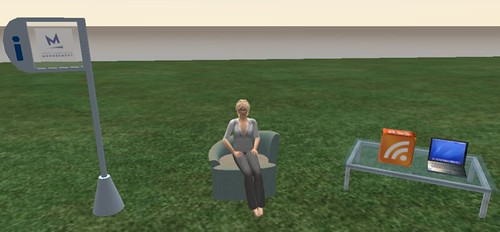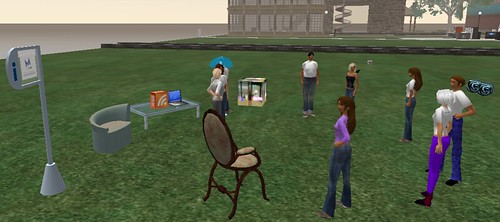Waiting for students
I already mentioned in a previous post that we'd introduce research blogs as an obligatory study activity this year (for our postgraduate students), and this Monday was the end of their first week of blogging. My task was to read them all though, assign grades, and write comments on blogs as a whole (I think the commenting part was THE important part of my task). I was really impressed with some of our students' blogs: many have managed to write really interesting posts, and it was really enjoyable to read some of their posts, get to know my students a bit better through their opinions and writing styles. We all still have a lot to learn about blogging, but the results of the first week show that some students have potentials for becoming good bloggers (I'd certainly love to some of them choose to continue blogging after the course), and that the majority of them will have no problems in completing this activity successfully.But of course, that was just my personal observation of the activity, so I was really excited about last night's meeting in SL, as I saw it as a perfect opportunity to talk about how they feel about their blogs and blogging. Some students said blogging really engaged them, and that they really enjoyed this activity although it is quite time consuming (that's pretty close to my personal experience of blogging). A few students said they still didn't understand the point of blogging: why would someone want to make his/her own journal public? That is quite a usual question related to blogging that I often hear (not just from my students). People often see blogs as public, personal journals and don't understand why people are willing to let everyone know what's going on with their lives. I think that a lot of people don't know that the blogosphere isn't just about people writing about their personal lives, but also about people sharing their professional experiences and their passions. I don't like to blog about my personal life, but I enjoy sharing my professional experiences - both to keep track of my own development and to contribute my knowledge and experiences to the community.
During last night's virtual discussion I was also positively surprised by some of the questions my students asked. For example: how can we tell the relevance of information on blogs? Another student figured out that blogs can't be the only source of information when doing research. This shows that they have a positive critical attitude towards blogs. Although most of them never used or even read blogs before, they approached them both with an open and a critical mind. They don't just do what we told them to, but they ask their own questions! Isn't that great? One student even asked: who invented blogs? And I must admit I couldn't answer that question *blushes* But I find it extremely positive that students think of such questions! Especially because my students are adults, most with kids and jobs, and some with little or no experience with ICT - but still they show great readiness to learn, and great curiosity! I really feel lucky to have such students.
During our discussion about blogs
Of course, I realize that the students that were willing to come to our virtual meeting in Second Life were probably the ones that had the most positive attitude towards the course or are naturally more motivated to learn new things, but still; honestly, I didn't expect so many students in SL, and I didn't think that so many of them would feel so positively about blogs, and all other course activities. But I guess it goes to prove that our educational systems have to be reinvented (call it Education 2.0 if you want :) ) and that the problem is not always with students not being interested.I'd like end this post by pointing out some of the important lessons that I've learned from last night's discussion and our first week of student blogging:
- Number one: the students really appreciate the fact that we're showing them new, real-life tools and giving them an opportunity (or even a reason) to try out new tools and learn about them in a different way (learning by doing). They like the fact that we challenge them, put them outside their comfort zone, and show them new tools.
- Number two: not everyone likes the concept of blogging. Some still think forums are the best way to express yourself and connect with other users. However, those that like blogging feel really engaged by the activity.
- Number three: Second Life is a good place to have discussions with your students. Adult students can put their kids to bed, and meet with their fellow students and instructors in the comfort of their own home. It can be a bit confusing to have multiple people trying to talk at the same time, but their "physical" presence does add a special feeling to it.
- And last but not least: it is all worth it. It does take a lot of time to read students' blogs, it does take a lot of time to master new tools like SL. In fact, since we've started with our online course I've often felt overwhelmed by having around 80 students to follow more times a day (also during the weekends), 32 blogs on different topics to read and to comment (and not being to use RSS as their blogs are private), preparing the SL meetings, and all other every day obligations. But in the end, when you see happy avatars typing about how much they enjoy your course... that's really the reward every educator wants to get at the end of the day, isn't it? :)
Yes, it is all worth it.
Note: This is just an archive post. The blog has moved to a new home at blog.ialja.com, where you will also find a copy of the entire blog.

